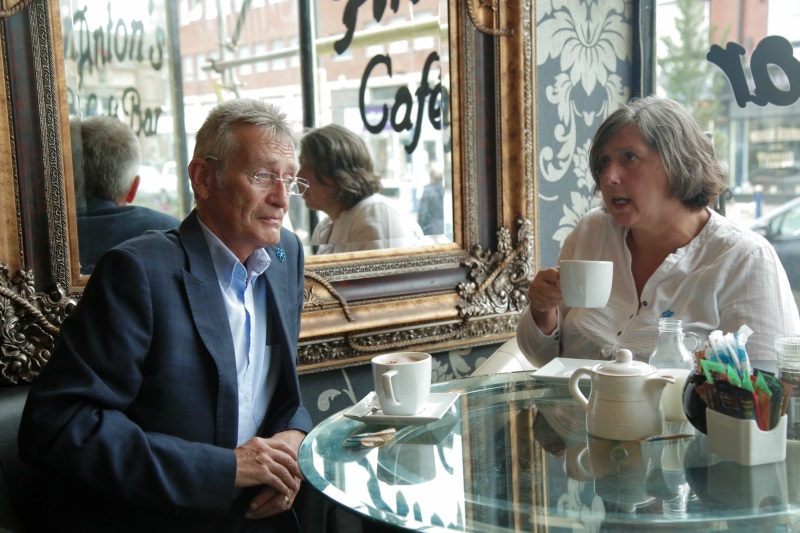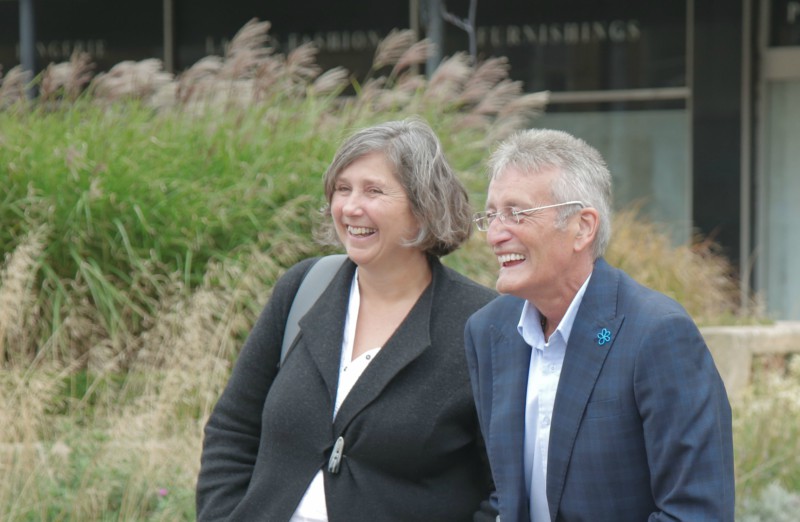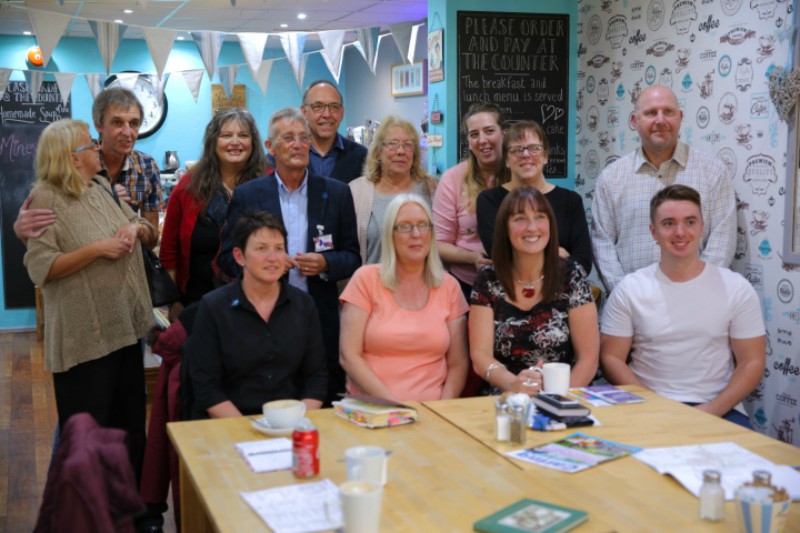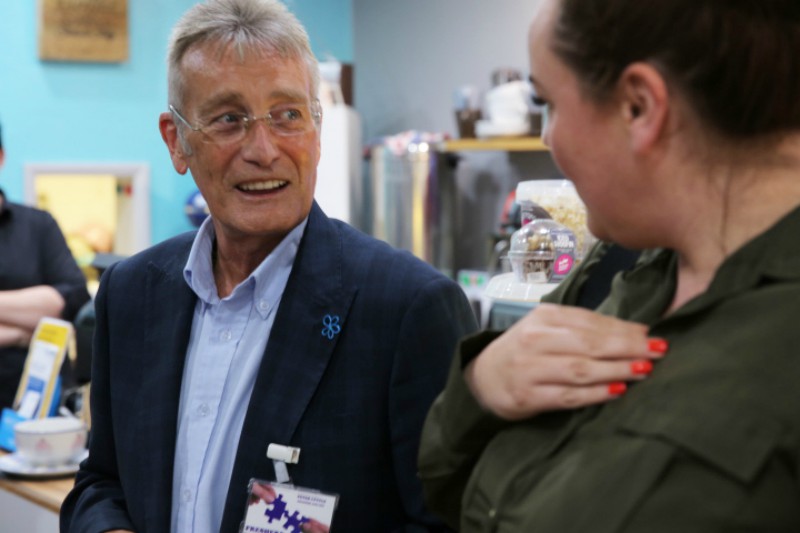Real stories
From a difficult diagnosis of vascular dementia to becoming a volunteer
Many people feel a dementia diagnosis means their life is over, and Peter Lyttle was no exception. After being diagnosed with vascular dementia at 58, Peter felt very low. Thankfully, things changed for the better after he attended a local support group.
It all started after a catalogue of incidents made Peter suspect he had a problem.
He ordered some clothes online in completely the wrong size. He made arrangements to meet friends only to show up a week early. Then one day standing at the cashpoint, he found himself with his bank card in his hand but with no idea what the machine he was looking at actually was.
'I found myself standing in front of the strange-looking instrument built into a wall and in my hand I was holding a piece of plastic. I felt scared, really scared. There were people queuing up behind me and they were making not very nice remarks.'

Seeking a memory test
Peter went for a routine blood test and asked the nurse if he could have a memory check too. He was told not to worry – he was too young for anything to be wrong.
They eventually let him take the test, which he failed. The next morning he repeated the memory test with his GP and got the same result.
Peter assumed his memory loss might be a side effect of the medicine he was taking for arthritis, though he was told that was unlikely. After being referred to a memory clinic, they found his recall to be well below average and so was finally ordered a brain scan.
Over six months had passed, but Peter didn’t breathe a word of his ordeal to either his friends or family.
I didn’t want to worry anyone unnecessarily,’ explains Peter.
Peter visited his family for Christmas but still didn’t tell them anything. He kept his fears about what the New Year might hold to himself.
Waiting months for a diagnosis
A couple of months later and Peter was at the hospital for the results of the brain scan.
‘I can tell you word for word how it went,’ Peter recalls.
‘The doctor said, unfortunately, we found a growth on the back of your neck and it’s attached to your spinal cord.’
Peter was trying to process that bombshell when the doctor added:
‘There’s no damage to the back of your brain, or to the middle of your brain, but there’s a lot of damage to your frontal lobes and you have vascular dementia.’
The damage to the brain was similar to that seen in patients who have been through chemotherapy, which Peter had not. The doctor said he was sorry but that there was nothing they could do. The appointment was over and the doctor got up and ushered Peter to the door. Outside the office, Peter demanded a prognosis.
‘You’ve seen my results, so where do you see me in five years’ time?’ he asked.
The doctor replied that Peter wouldn’t be alive in five years, and advised him to pick up some leaflets about his condition.
'I just stood there on my own and felt there was nobody there to help me. I’d stopped smoking for six months then – it was a big thing for me – and the first thing I did was I went and bought 20 cigarettes.’
‘I was scared, confused. I felt so bad and so down.’
Peter felt like there was nobody to help him and was struggling to deal with his diagnosis alone.
‘I started spiraling out of control so I decided, and I’m so ashamed now, that I was going to end it all. I was feeling very low and suicidal.'
But that same week a letter landed on the doormat from Alzheimer’s Society. It invited Peter to a coffee morning for people with dementia.
![]()
Search for local support near you
The meeting that changed everything
At first, Peter felt embarrassed and slightly put out by Alzheimer’s Society’s invitation to a Dementia Café. Everyone would be much older than him. But after promising his brother he’d try it, he went along anyway.
‘I went along and spoke to a Dementia Adviser called Elaine, who was running the event, and said thanks for inviting me, but I’m not staying because everyone here’s older than I am and I don’t think I fit in. She said: “That’s fine.” But as I turned to walk away she said: “Don’t think you’re going to get away so easily!”’
After only meeting briefly at the Café, Elaine decided to visit Peter the following morning for a chat. It was this chat that had a profound effect on him. They talked about Alzheimer’s Society and how people with dementia can still lead active and meaningful lives.
‘Within half an hour it was like someone had turned a light switch back on and I went back to being me. She just talked to me and explained various things.
‘She made me realise that there is life after your diagnosis. That lady saved my life, she really saved my life. I can never thank her enough for what she did.’
Meeting Elaine transformed Peter’s outlook, helping him regain his self-esteem and get his old confidence back.
‘If I have a problem I just pick up the phone – there’s always someone there,’ he says.
Living well with dementia
Having had that light switch turned back on; Peter is proof that people can live well with dementia. He is now dedicated to helping others get over the shock of their diagnosis and get on with their lives in the best way they can.
‘I met Elaine on the Thursday and the following morning I was on the local radio telling my story. I haven’t stopped since.’

Since then Peter has been spreading the word that there is support out there.
He volunteers with Alzheimer's Society to ensure no-one else feels as isolated after their diagnosis as he did. He gives talks to medical students at colleges in Preston and Blackpool, and has started his own dementia café’s for people of his own age and their family and friends.
As a member of a Service User Review Panel, he also uses his experiences to influence the national work of Alzheimer’s Society and help make his local area more dementia friendly.
Peter’s attitude towards his dementia is nothing if not positive.
‘It’s not about me, it’s never been about me,’ he insists. ‘I just don’t want other people to go through what I went through. If you can help somebody, even if it’s just one person, then I think that’s brilliant.’
‘You’re only here once so you’ve got to make the most of it,’ he says.
Three years after his dementia diagnosis, Peter is as active as ever. Passionate about supporting Alzheimer’s Society, he is helping out in almost any way he can, from speaking at special events to training up staff.
And if that wasn’t enough, Peter has also set up his own cafes for people living with dementia, Fresher’s Young Dementia Café.
Identifying the large number of young people with Alzheimer’s or dementia, this activity and social group is aimed at people of 40 plus and their partners. And Peter is continuing to expand, with more groups in Lancashire, his home county.
Volunteering with Alzheimer's Society
Living with dementia, Peter takes each day as it comes. But says it's his volunteering that's helping him thrive:
'Volunteering has given me a whole new lease of life, which is ironic.'
‘It gives me a focus and I do it because I don't want anyone to go through what I did and not have anyone to turn to or to support them.’
‘When someone comes to a group and feels safe and relaxed enough to speak for the first time in a long time, that's just wonderful.'
'Seeing their partner's face light up when all a sudden the person they love starts to come to life again – that’s worth a million pounds to me.'
Peter admits he’s never been busier and is showing no signs of slowing down. Perhaps what’s most inspiring is that Peter’s motivation is other people – he says his work has never been about him. It’s simply that he doesn’t want anyone else to go through what he went through.
‘I think I’m a lucky man to be in the situation I’m in, because I know I can help people. I’m trying to help as many people as I can. And I think in this life if you can do something like that, it’s brilliant.’

Peter at one of his dementia cafés
Unite against dementia
Globally, dementia is one of the biggest challenges we face. There are nearly 50 million people living with dementia worldwide, and an estimated 850,000 people living with dementia in the UK.
Sadly Peter’s diagnosis journey is not uncommon. People often have to wait years before receiving a final diagnosis, often leaving them feeling desperate and alone. Help us reach everyone affected by dementia.
Make a donation
Your kind donations ensure that Alzheimer’s Society can be there for every person affected by dementia. Your gift helps us to challenge perceptions, fund research and improve care and support. Together, we are united against dementia.
This blog post was originally published in 2017 in three parts. In 2021, it was combined into one post.



Heather Martin
saysEllin Jones
saysHi Claire
I've only just seen your post so you may have now realised you can down load or purchase wallet/purse size cards/ID from the Alzheimer's society website. These are useful not just for the person living with dementia but also to show members of the public when interacting with them. This is the link:
https://www.alzheimers.org.uk/get-support/publications-and-factsheets/h…
These say 'I have memory loss' there are others which refer to Dementia
claire smith
saysi work at a doctors surgery and we are desperate for cards/id for our dementia patients to carry with them any idea where we can purchase these from
Anonymous
saysHi Claire, thanks for your comment.
I'm not sure, but it sounds like you could be referring to our This is Me resource. It's available to download or order here: https://www.alzheimers.org.uk/get-support/publications-factsheets/this-…
Hope this is helpful, and don't hesitate to get back in touch.
Thanks,
--
Alzheimer's Society blog team
Neville Pearson
saysMy Mother has Dementia. She pays £600 per week to be in a Care Home. The Home do not answer my letters or emails asking how she is.
Eileen Jaques
saysAs a person living with dementia for about five years, I feel that I have been lucky in that I have joined a group of other people who are also ‘suffering’ from it. We meet fortnightly, when we talk about all sorts of things, sometimes related to dementia, sometimes not. In addition, there is a Women’s group, where we usually finish up putting the world to rights and having a good laugh.
Eileen Jaques
saysAs a person living with dementia for about five years, I feel that I have been lucky in that I have joined a group of other people who are also 'suffering' from it. We meet fortnightly, when we talk about all sorts of things, sometimes related to dementia, sometimes not. In addition, there is a Women's group, where we usually finish up putting the world to rights and having a good laugh.
Tracey
saysThis sounds similar to the group I’m part of. It’s run by my dementia support worker we do the same meet once a fortnight. We always do something different & have a laugh as well as supporting each other through the good & bad times.
Marie Joseph
saysUnfortunately getting a diagnosis of Dementia/Alzheimers was a difficult process a few years ago, as was in my husbands situation too. It took well over 15 years before 'dementia' was mentioned very co-incidentally. And he was diagnosed with Vascular Dementia. So it is a very sorry situation to read about Peters story. But fortunately, once help is accessed, it is amazing what there is in the community that is on offer. The difficult part is that the carer and cared for has to have the perseverance and determination to find and accept help and not give up. Glad there is going to be a positive outcome for Peter, I am hoping.
Alan Brett
saysSadly, Peter had been badly let down by the system.My wife has advanced Alzheimers and fortunately our experience has been very positive. It highlights the "post code lottery" and there should be closer integration of service providers and a common system throughout the UK. Devolution, in respect of health and care provision has been an absolute disaster and MUST be reversed! Anyone in Peter's position should make the Alzheimers Society their first port of call, or Age Concern, to make representations on their behalf and receive advice if they are simply put off by the professionals who are supposed to deliver proper care.
Lyn
saysI hope he found help. My husband was diagnosed at 63 although was poorly before family had noticed several changes. I still don't know where to go to get support for both of us Solihull Alzheimers Society gives out endless leaflets but no real hands on help. Dementia Cafe in Knowle is aimed at 80+ similarly singing for the brain. Never offer talks for carer etc. Interested to know what other areas offer.
sarah
saysLyn Walsall is the same. The local Pathways 4Life visitor wasn't much help, she even disagreed with the doctors diagnosis ! She came to visit my parents and didn't bring any paperwork with her so nothing got sorted ! She told my mum to buy a Kindle for my dad to read, but he can no-longer read so what would be the point, but she ignored my mum and just repeated 'buy him a Kindle'. We were offered speech therapy months ago, but still nothing. You feel alone, lost and out of your depth trying to cope. Like your husband my dad is in his 60's, most Dementia cafes are aimed at the 80's and over, there needs to be more for younger people and their careers. I hope you do finally get the help and support needed.
Alzheimer's Society
saysHi Lyn, I’m sorry to hear of your experiences.
For information about services available in Solihull, please visit:
https://www.alzheimers.org.uk/info/20011/find_support_near_you#!/search
There appears to be a number of services run by Alzheimer’s Society that provide support in terms of information and advice, advocacy, carer support groups. You may wish to consider contacting Alzheimer’s Society that covers Birmingham and Solihull who can provide support and information on local services including carers support groups. The team there are available on 01217064052 or via email on birminghamandsolihull@alzheimers.org.uk.
Carers UK also provides support to carers plus advice on welfare benefits. You can reach them on phone by 08088087777 or visit their website: www.carersuk.org
Talking Point is an online forum run by Alzheimer's Society. It is an online community that provides valuable support, tips and advice to anyone affected by dementia; this includes family friends, carers as well as people with dementia. Some people have found this to be a useful support. You can visit Talking Point here: http://forum.alzheimers.org.uk/forum.php
Should you wish to discuss any of the above please do not hesitate to contact National Dementia Helpline. Telephone: 03002221122; Email: Enquires@alzheimers.org.uk
I hope the above is helpful.
Kind regards